UCPI Daily Report, 11 Nov 2020
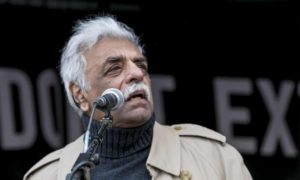
Tariq Ali
Tranche 1, Phase 1, Day 8
11 November 2020
Evidence from:
Tariq Ali, activist and writer
Today, after seven days of opening statements from the participants, the Undercover Policing Inquiry finally started to take evidence from witnesses.
And, after seven days of live-streaming, the hearings have moved to a format that excludes those trying to follow.
THE PRIVATE PUBLIC INQUIRY
Instead of a live-streaming the speakers, there is a live transcript that moves quickly and cannot be paused or rewound.
BBC reporter Dominic Casciani explained his exasperation:
‘This set up does not assist, at a very basic level, reporters to do their job of reporting a *public inquiry* established by the Home Secretary to *answer public concerns* about abuses by some officers’. I can’t type that fast to copy down everything.
‘If I could hear the audio – which we are not allowed to do – I could take down quotes in shorthand. We cannot scroll back to check quotes. 20 years ago at the Bloody Sunday Inquiry, we could do that.
‘The transcript is being posted as a document after any deadlines for daily reporting. This means that I and others are going to struggle to report the inquiry contemporaneously for evening deadlines. This basically means, from a practical perspective as a working reporter, that a public inquiry becomes largely impossible to report.’
COPS was among those who were able to live tweet, because the Inquiry has provided live-streaming at a venue in London. It’s a large, unventilated room with no windows containing socially distanced desks without power sockets. The live-stream there has no time delay, but the Chair has imposed a ten minute delay on tweeting what is said.
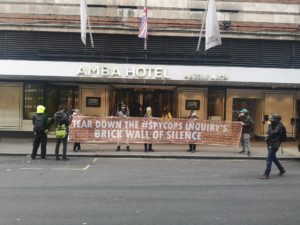
Core participants of the Undercover Policing Inquiry at the London live-streaming venue, 11 November 2020
If these conditions don’t put you off and you would like to attend, tough. You had to apply weeks in advance, going through the whole process for each individual day you wish to attend. The Inquiry only confirmed who had actually been allocated places in an email sent at 10.16pm last night.
The Inquiry knows that victims are spread across the country, and indeed the world, and need to make travel arrangements. One of them, Tom Fowler, has had to travel from low-Covid Wales to lock-down London to live-tweet the hearings.
There can be no excusing this as being the fault of the emergency measures brought in due to Covid. The Inquiry has had an extra five months to make these arrangements. Today’s inadequacies reflect their original plan, of hearings without live-streaming, in a room that couldn’t even hold half of the significantly affected victims who have been designated ‘core participants’, let alone any interested members of the public. And the Inquiry has consistently rejected the suggestion of live-streaming.
EXCLUSION IS A CHOICE NOT A NECESSITY
Meanwhile, other inquiries such as Grenfell and Manchester Arena, which also have to ensure they don’t inadvertently release any sensitive information, have public live-streams. Why can we watch Grenfell hearings on YouTube yet the UCPI only gives us what amounts to speeded-up Ceefax?
Those who do follow the hearings are blindfolded by the Inquiry’s refusal to publish documents until after each hearing, meaning the transcript is examining and discussing things that those outside cannot see.
These are yet more ways in which this Inquiry demonstrates its belief that the victims are marginal and the public merely an irrelevant afterthought.
The Chair, Sir John Mitting, appears to believe himself capable of understanding it all – we plebs needn’t be bothered until he hands us his report. A man who believes he is impartial yet thinks the Macpherson definition of institutional racism is ‘controversial’. A man who thinks he understands how things work and will see through the lies, yet grants anonymity to spycops because he believes any officer who has been married for a long time is incapable of serious wrongdoing.
Mitting has rebuffed repeated demands for a diverse panel to assist him, something that has been standard at such inquiries for over 20 years, because he thinks himself incapable of significant unconscious bias.
FIRST WITNESS: TARIQ ALI
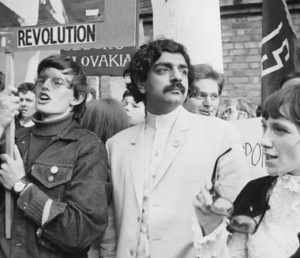
Tariq Ali
The opening phase of the Inquiry will be witness hearings over five days until the end of next week concerned with the earliest days of the Metropolitan Police’s Special Demonstration Squad, 1968-72.
The unit was formed after trouble at a demonstration against the Vietnam War in March 1968, in which windows were broken at the American Embassy in Grosvenor Square, London. The original aim was to have officers live undercover as activists to gather intelligence in order to prevent a repeat of the disturbance at a second demonstration in October of that year.
Tariq Ali is a 77 year old journalist, writer and broadcaster, who has been politically engaged all his life. In 1968 he was a key member of the Vietnam Solidarity Campaign (VSC), and of the Ad Hoc Committee, which organised the London demonstrations against the war.
The Undercover Policing Inquiry devoted the entirety of this first day to questioning Ali.
MILITANCY OF HEART
David Barr QC, Counsel to the Inquiry, began by reading excerpts from Ali’s autobiography, Street Fighting Years: An Autobiography of the Sixties, that cover the events of 22 October 1967.
This included an account of demonstrators coming very close to entering the US Embassy during the demonstration.
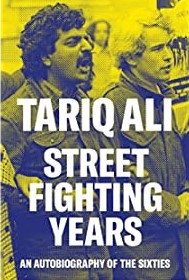 Barr asked Ali to account for his use of the word ‘militancy’. He explained that other groups at the time were demanding peace in Vietnam, but the VSC didn’t want ‘the peace of the graveyard’, they supported the Vietnamese people in their struggle against the American occupation.
Barr asked Ali to account for his use of the word ‘militancy’. He explained that other groups at the time were demanding peace in Vietnam, but the VSC didn’t want ‘the peace of the graveyard’, they supported the Vietnamese people in their struggle against the American occupation.
Barr QC asked if ‘militancy would include a “shoving through” to get to the embassy?’
‘No,’ Ali replied, the militancy was in reference to political support for the NLF [National Liberation Front of South Vietnam, aka the Viet Cong]’. Ali would not be drawn into the concept that being ‘a militant group’ meant violence, but rather a politically partisan position. In this case, a position that was supported by 25% of the UK population according to the opinion polls of the time.
Ali said that there were plenty of discussions about taking further direct action at the American Embassy in Grosvenor Square. He said they had dreamed of taking over the Embassy’s telex machine and sending a message of support to the Viet Cong in Saigon. The VSC discussed the idea of occupying the embassy, but some thought it was ‘foolish’ to imagine that the State wouldn’t try to prevent this.
As someone who had only been in the country for a short time, in the event of arrest Ali faced a risk of deportation as well as imprisonment.
Barr: Would it be true there were official aims and unofficial aims of the VSC?
Ali: Yes
Barr: Kept secret to a small circle? The Ad Hoc Committee?
Ali: Just the ones in London.
Barr: The desire to storm the embassy remained?
Ali: Yes, the first demo had been a missed opportunity.
Barr: Why didn’t you push ahead with the plan? Was it fear of your legal situation?
Ali: Yes.
Barr: So you were going to see on the day?
Ali: Yes.
Ali then recollected the composition of the VSC’s ‘National Committee’. Pat Jordan told the group that ‘every single one of my speeches had been noted and studied by Special Branch’.
OUTSIDE ASSISTANCE
The London VSC group was boosted by the support they received from American activists, politicians, Black organisers, and others. Among the American anti-war activists who were in the UK at the time, some of them dodging the draft, was 21 year old Bill Clinton.
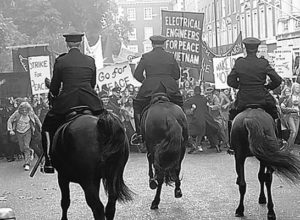
Police on horseback charge demonstrators against the Vietnam War, Grosvenor Square, 17 March 1968
As with many subsequent anti-war demonstrations, the protesters did not have overwhelming public support. Two thirds of the British population were in favour of the war in Vietnam, which was very different to other places like France.
Organisers of the March 1968 demonstration had no idea how many police to expect, but they knew that if they were heavily outnumbered there would be no chance of even a ‘token occupation’ of the American Embassy.
There had been a well-publicised rumour that American Marines were waiting inside the embassy on the day of the protest ready to fire live rounds into the crowd if they breached security.
Barr asked a lot of questions about the chances of violence from the protesters and whether the VSC encouraged it, or was at least unable to prevent it. He said that ‘come armed’ stickers had been put on some leaflets for the demonstration.
Ali dismissed the stickers as ‘childish nonsense’ and said that nobody in the VSC or the other groups active against the War behaved in this way, and that at the time he wondered if these stickers were the work of agents provocateur. Ali said he has a very clear memory of the VSC denouncing these stickers at the time.
MAOISTS & ANARCHISTS
Barr asked about the other groups that existed at the time, for example the Maoists.
Ali explained that he had very little to do with the Maoists – they acted autonomously on the whole, and only ‘grudgingly’ accepted any of the VSC’s ‘discipline’. He recalled an Irish Maoist group led by someone called Ed Davoren, ‘but I do not recall him saying anything particularly outrageous’.
The Maoists, Ali explained, tended to regard the VSC committee as ‘revisionists and class traitors and whatever else’.
He was asked about anarchist groups, but Ali said they were small, hostile to the VSC and often didn’t bother joining in with the demonstrations. The insignificance of these groups was such that Ali can’t even remember their names.
He remembered seeing the anarchist newspaper, Freedom, but felt the anarchists were ‘not too strong’ as they were small in number and apparently easy to identify due to their T-shirts [whatever that means].
EUROPEAN SOLIDARITY
The March 1968 demonstration is described on p.254 of Ali’s aforementioned book. It was, he wrote, ‘a marvelous display of colourful flags and banners’. These were people optimistic about a new world without the kinds of conflict they saw around them. They were aware of the Prague Spring going on, which brought hope of compassionate and effective socialism; there was a feeling that change was possible.
A large contingent from Sozialistische Deutsche Studentenbund, the Socialist German Student Union, came to London from Berlin to join the demonstration. They had a lot of experience of street demonstrations, and brought helmets and their own banner with them.
Ali described them linking arms as they marched, a display of solidarity that also defended them from police attacks, which the VSC hadn’t seen before. Ali said he had no memory of what exactly the Germans did that day, but doubts that they acted alone, they were all part of a huge protest. The tabloid press were not used to seeing Germans at demonstrations, so gave this a lot of coverage.
There was also a French contingent, but they were not mentioned, perhaps because they didn’t adopt visible identifiers like the helmets.
There were several attempts to break through the police lines that day, and it certainly wasn’t the work of the German students alone, ‘nice English students’ were involved as well. Ali does not think the presence of any one group warranted such emphasis.
Barr: Would the German Sozialistische Deutsche Studentenbund have followed the official position of the VSC on the protest?
Ali: Yes.
Barr: So if the balances of forces on the day had been right, they would have joined to storm the US embassy?
Ali: Undoubtedly.
LOSING THEIR MARBLES
The square and surrounding streets were full of people, there were scuffles, the police decided to send in the horses. Ali heard people shouting ‘the Cossacks are coming’. Barr questioned Ali about the throwing of marbles at horses. Ali did not witness this, but it was talked about afterwards.
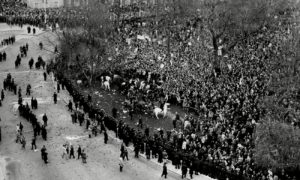
US embassy protest, Grosvenor Square, 17 March 1968, aerial view
He illustrated this with a story about support for the VSC not coming exclusively from the young, they were supported by people of all classes, some of whom supplied funding and valuable advice about more effective ways of dealing with horses (involving a string touching the horse’s knee).
Nonetheless, Barr laboured the point about marbles as well as smoke-bombs and other items that may have been brought to the demonstration by individuals.
Ali saw a small number of fireworks, ‘to increase excitement, not to harm anyone’. Barr countered that the VSC didn’t dissuade people from escalating action, something that wouldn’t have been organisationally possible in such circumstances.
Barr is focusing very directly on the role of the protesters in what was, as the vintage footage shows, a direct and deliberate attack on a crowd by the police.
The lack of any questions about police violence, the injustice of the war in Vietnam, the huge death toll of the war, and so on, show the priorities of the Inquiry. Ali was the only at the hearing one to mention the injuries, some serious, suffered by demonstrators on the day due to police violence.
UNDERLYING PHILOSOPHY
‘We wanted the toppling of regimes in Eastern Europe and their replacement with the Czech model, ‘socialism with a human face’, Ali explained. However, he was realistic.
Barr: Were your ultimate aspirations revolutionary?
Ali: Not in Britain.
Barr: You didn’t think the anti-Vietnam War protest would lead to revolution?
Ali: You’d have to be deranged to think that.
Barr: Given the air of change in the wind, you saw the demonstration as part of piece of the jigsaw for a world wide revolution and world wide socialism?
Ali, laughing: No, not really.
Ali and his comrades felt serious socialism was not possible in western Europe without democracy very firmly attached to it.
When he visited Vietnam, he asked North Vietnamese leaders if international brigades of volunteer troops would be a useful response of solidarity from other parts of the world. ‘This is not the Spanish Civil War. The last thing we want is for people like you to come and die here,’ he was bluntly told. ‘All we want from you is to build movements abroad’ to help to bring the war to an end.
Barr: You say that you thought that Parliament should be replaced by Worker’s Councils, is that true?
Ali: We used to think like that. We wanted something like what the Chartists advocated in the 19th century. We explored all these ideas.
The group’s politics evolved over time, but they were generally in favour of far more direct democracy. The current ‘first past the post’ system distorts election results, delivering a succession of governments who have only received a minority of the votes.
UNLIKELY SUPPORTERS
The first evidence to be shown on the screen was a Special Branch report, prepared for the Director of Public Prosecutions, following the demo in March 1968. The group interrupted theater shows to talk about Vietnam.
The audiences were mostly sympathetic to the anti-war cause, but actors were hostile on the whole (with the strange exception of the Black & White Minstrel Show, something so unrelentingly racist that even in 1968 there were petitions to against it).
After the conflict at the March 1968 demonstration, both the VSC and police turned their thoughts to organising for the next demonstration in October. The Met created the what was first called Special Operations Squad, who went to live as anti-war activists.
NEWSPAPERS & PROVOCATEURS
The next picture was of a Guardian article from May 1968, entitled ‘Tariq Ali Talks of New London Demonstration’. There is a reference to Ali saying they planned to occupy the Bank of England. Barr suggest that even if was a joke, only uttered once in the press, it meant that the police were compelled to respond.
Ali’s book, on p.293, quotes an American woman from the Students for a Democratic Society (the third different ‘SDS’ mentioned in this hearing!) who said that the only way to defeat the war machine in her country was to emulate the Viet Cong guerrillas who had attacked the US Embassy in Saigon.
She was suggesting a bombing campaign against the corporations who were profiting from the war in Vietnam by producing chemical weapons and other supplies.
Ali explained that he argued strongly against this tactical approach, calling it ‘suicidal in every sense’. He added, ‘I had to think very hard whether the person who wanted to embark on such a course was deranged or a straightforward provocateur’.
Asked about what he knew at the time about police or Special Branch infiltration, Ali responded, ‘we had no evidence, obviously, but we had no doubt that we were under surveillance – there was hysteria in the press. On one occasion a postman dragged me out of the office and told me that our letters were opened every day’.
BLACK DWARF
Ali’s suspicions about provocateurs seem well founded. On one occasion, some ‘hippy anarchists’ spent the night at the Soho office of Black Dwarf, a socialist newspaper which Ali edited. Ali and the others were horrified to see the next morning that these guests had painted a large diagram of how to make a Molotov cocktail on the wall.
He described their response:
‘We covered their crude artwork with a poster. The very next day, the office was raided by the police – they went straight to the poster and pulled it down to uncover the artwork beneath’.
The office had often been made available as somewhere for comrades visiting from other places to sleep. But after this incident, the Black Dwarf group became more strict about letting people sleep in there.
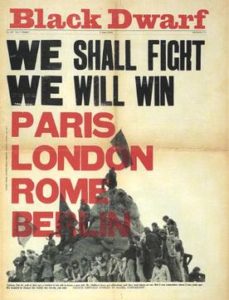
Black Dwarf, June 1968
Barr, welcoming a return to his recurring theme of violence, asked if Molotov cocktails were ever used at a VSC demonstration. Ali responded emphatically, saying that he had no knowledge of anyone ever proposing or intending to take a Molotov cocktail to a VSC-organised demonstration.
Ali questioned the police’s description of information gathered from infiltrating a national VSC meeting, and pointed out that this intelligence was not particularly ‘valuable’ or secret, there was no need to infiltrate the group in order to get that information.
He challenged the view that it was either vital or necessary. The route of the demonstration was publicly debated, and much contested by various groupings. Some people, he said, ‘wanted a punch-up in Grosvenor Square, which we were opposed to’.
The next document brought up as evidence was a Special Branch report on Black Dwarf, which reproduced a column published on the back page of the magazine in October 1968, entitled ‘Softly Softly’.
Although Ali was editor of Black Dwarf, he was often away traveling so did not personally oversee the content of each issue, just endeavoured to ‘cast an eye’ over it. He agreed that this particular piece was not especially well written.
The main message of the article was that the police should be given no excuse to stop the demonstrators from reaching their intended destination. ‘The coaches must get through!’ was in capital letters. It said not to bring anything that could be construed as suspicious, mentioning the marbles and fireworks that so preoccupied David Barr QC at the hearing.
Barr suggested that the article telling people not to bring things like marbles or fireworks, is in fact, an attempt to suggest people should bring them.
Barr cited contemporaneous leaflets from campaigns advocating provocation. Ali pointed out that ‘it’s one thing to write some nonsense… but a completely different thing to actually carry it out’. It wasn’t forbidden to write things, and at that time people were writing all sorts of things.
VIOLENCE AGAINST TEXTILES
After Barr’s ignoring of the police violence against protesters in March 1968, he seemed surprisingly concerned about violence against small pieces of textiles. He asked Ali about a public meeting that took place before the October protest, specifically whether a plain-clothes police officer would have been able to safely attend. Ali said it was.
Barr: This was peaceful, except for the burning of a flag outside Australia House.
Ali: That is still a peaceful act.
The October 1968 demonstration was planned by the VSC as a ‘peaceful show of strength’:
‘We don’t want mindless militancy. We want this to a be a politically militant demonstration of solidarity, not only with Vietnam but with each other’
Stewards were provided by all the organisations who supported the demo. They would have been briefed ahead of the day, short briefing that morning on the Embankment.
Asked ‘to what extent did the marchers exhibit “revolutionary self-discipline”?’ Ali replied ‘we were so relaxed that we forgot we were passing Downing Street – a police officer had to remind me’. He recollected having to scribble a ‘Dear Harold’ message to the Prime Minister of the day on a scrap of paper.
There was an attempt made to kidnap Ali, by a group of unknown men. They did this the night before the demo, probably with the aim of preventing him from attending it. This was in Carlisle Street in Soho, just outside the Black Dwarf office, and luckily was prevented by his comrades, who had noticed it just in time.
SPECIAL BRANCH REPORT: AUTUMN OFFENSIVE
The next document shown by the Inquiry was a Special Branch report from DI Dixon on the VSC ‘Autumn Offensive’ (i.e. the demo on October 27 1968) and the potential for violence. It describes the VSC as ‘Trotskyist-dominated’ and ‘the most influential’ of the extremist groups.
Ali was scathing and unequivocal, saying ‘it’s completely false. It’s fantasy land’.
Barr wasn’t persuaded. ‘Intelligence reports that show there wasn’t any secret agenda is useful in itself, wouldn’t you agree?’
‘No’ said Ali. ‘It’s not useful and it’s not intelligence’.
Ali was not in Grosvenor Square himself that day. He only got third-hand reports, largely from the press, of the events there. But certainly, it was no surprise to anyone that there would be police there.
The VSC had no authority over those who attended the protests, or how they behaved, and had no way of compelling them to act in a certain way.
Page 11 of the Special Branch report lists the number of arrests made before the demo (26, only three of whom received summonses), during the demo (17), and after the demo (one, someone who threw a bottle at the Embassy). Interestingly, it notes that ‘apart from three fascists, none had hitherto come to notice’.
Page 4 of the same document details some of the arrests made the night before the October 1968 demo. These included one German national arrested at St Pancra’s station with a gas pistol and an unspecified amount of cannabis resin. There was also someone who’d been found trying to gain entry to police stables at Hammersmith, it is thought that he intended tampering with the police horses stabled there. Additionally, ‘two youths stopped by police in Green Street, were found to be in possession of radio-jamming equipment and perspex eye shields’.
Barr, seemingly unaware that he was making a non-sequitur, asks if this proves that the spycops were useful. ‘Not at all,’ Ali replied, ‘this was done by normal police’.
The report self-justifies, saying that, despite the crowd’s wishes, there had been no serious disorder because of the intervention of spycops. Ali flatly refuted this, saying ‘this is false, the crowd didn’t have to follow our lead, they could have run riot, they didn’t’.
VSC ORGANISING
Referring to questions about the national organisation of the VSC, Ali got a chuckle from the room when he said ‘this is an eye-opener – I had no idea there were any Maoists in Nottingham’.
Ali’s book talks on p.329 of 1968 as being the ‘last big assembly of revolutionary forces’. What he thought was needed at the time was a unified youth movement, that united young people from all the different left-wing groups, including those who’d been expelled from the Labour party.
We saw a secret police report of the VSC’s 1969 national conference. Well, we almost saw it, it was a lot of fuzz on our screen. Even Ali complained that it was near-impossible to read this document as it was very faded.
According to the second paragraph, the credentials of both official delegates and accredited observers were checked at the door. Voting cards were issued to delegates only. It was a closed event, not open to the public.
Barr asked if the closed nature of the event meant that a plain-clothes (rather than an undercover) police officer would not have been able to gain entry to this conference.
Another SDS report, on a meeting 52 years ago to the day in Conway Hall, includes long quotes from Ali that ‘a real revolution could have taken place’. Ali dismissed the report out of hand, telling the Inquiry, ‘it’s a fabrication, I would never ever talk in these terms. At best, it’s an extreme exaggeration’.
INTERNATIONAL MARXIST GROUP
In the afternoon session, the Inquiry moved on to other parts of Tariq Ali’s long active life.
He was a member of the International Marxist Group (IMG), a British section of an international organisation known as the Fourth International, created by Trotsky in 1938 after he broke with Stalinism.
The IMG had branches in many towns and cities, including Birmingham, Leicester, Chesterfield, Manchester, London, Nottingham, Hull, Oxford, Norwich, Folkestone, Edinburgh, York, Glasgow, Reading and Crewe, and about 100 members at that time (though some branches may have had but a single member).
Ali explained that the Fourth International grew slowly, and it never became a truly mass movement except in Bolivia and Sri Lanka. In Europe, the French movement was perhaps the largest, with around 50,000 members at its peak.
In the UK, the IMG’s membership grew to a thousand at the most. It aimed to create left-wing Marxist parties to challenge Labour for the loyalties of the working class.
It’s interesting to note the questions that David Barr QC, Counsel to the Inquiry, asks about the group: Did the IMG use violence? Did members of the IMG commit serious criminal offences to further their aims?
Ali had to be emphatic that the IMG’s aims and tactics did not include violence, or any serious criminal activities. He said it was possible that the odd member did, but if that was the case it was certainly not known to him.
SPYING ON TRADE UNIONISTS
Next, the Inquiry was shown a special report, signed by officer ‘HN340’ – a Special Demonstration Squad officer using the name ‘Alan Nixon’- and countersigned by Chief Inspector Saunders.
The report describes discussions among North London Red Circle about the Upper Clyde Shipbuilders industrial dispute. Barr asked about a line that read ‘it was important that IMG activity within the unions ensured they could better exploit any future revolutionary situation’.
Ali said he feared that the capitalists would win that particular dispute. He very rarely attended these discussions, which were set up by the Red Mole newspaper and therefore often the first contact people made with the IMG. Paragraph 4 suggests that Ali was present, but he cannot recall this meeting at all.
Ali confirmed that IMG members’ involvement in trade unions was open and unashamed, rather than covert.
SPYING ON ELECTION CAMPAIGNS
On 14 April 1977, the IMG held a meeting at Southall Town Hall as part of their Greater London Council election campaign. About 50 people attended. It was suggested, by the spycops officer who reported on it, that many of the white attendees were not local to Southall.
Ali was asked for his reaction to the discovery that the police had been reporting on this. He said it was so unnecessary, what was going on was no big secret. It was a public meeting, anyone was welcome.
There was then more discussion of the Anti Nazi League (ANL) and its strategies for combatting racism. Ali reminded us of the slogan ‘self defence is no offence’.
SPYING ON A CONCERT IN A PARK
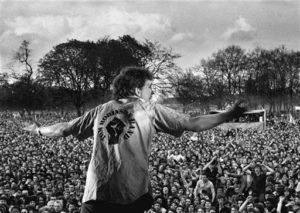
Tom Robinson, Carnival Against the Nazis, April 1978
Another SDS report was shown to the Inquiry, listing 229 names of people identified from the 100,000 people attending the ANL’s Carnival Against the Nazis, a free concert in April 1978 – including Tariq Ali and fellow core participants at the Inquiry, Peter Hain, Colin Clark and Dave Morris.
The free concert featured The Clash, Steel Pulse, X-Ray Spex, and the Tom Robinson Band.
Ali said it was a pleasant day, with lots of children and music, and he could not recall any violence.
The next such report listed 69 named individuals who attended an ANL march and rally on 14 May 1978, including, again, Ali and Dave Morris.
KNOCKED OUT IN SOUTHALL
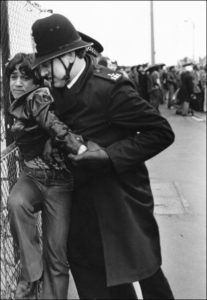
Police arrest a youth in Southall, April 1979
We then heard about a demonstration against the National Front in Southall on 23 April 1979. At the time, Ali was the Socialist Unity parliamentary candidate in that constituency.
Local organisers were worried about the possibility of racist attacks, and put Ali in a safe house to keep him out of any trouble. He was holed up with reggae band Misty in Roots when the police charged into the house, and pulled everyone out. An estimated £10,000 of damage was done to the contents of the house, including the equipment of Misty in Roots.
Ali and the others were made to run a gauntlet, and he was truncheoned so severely that he passed out. The skull of Clarence Baker, manager of Misty in Roots, was fractured and he was in a coma for five months. Ali woke up in a police vehicle, under arrest. Upon his eventual release, he had to walk home.
He said that the police’s treatment of them that day made him think of a colonial police manual from the days of the Raj. At the trial of one of those arrested, one of the police officers testified that ‘there was no overall direction of the police forces at this time’ and described it as ‘a free for all’. Needless to say, no police officers were charged with anything.
BLAIR PEACH
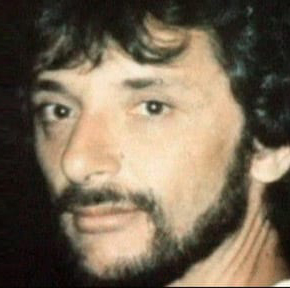
Blair Peach
That was the same day that Blair Peach – who we have already heard about in this Inquiry – was killed by the police in Southall. When the police unit responsible had its lockers searched, weapons found included a crowbar, metal cosh, whip handle, stock ship, brass handle, knives, American-style truncheons, a rhino whip and a pickaxe handle.
This rather sets Barr’s suggestion that people shouldn’t be caught with marbles on their way to a demo into relief.
Unsurprisingly, the next report was on a meeting called by those campaigning for justice after Blair Peach’s death, which Ali attended.
Barr apologised for being repetitive in his questions, but asked Ali how he felt about being spied on at this event. Ali retorted:
‘What is the point of having a report like this except to keep people in work? Or to make my file heftier than it was, for absolutely no rhyme or reason?’
Ali was invited to speak at a wide range of public meetings over many years. He was involved in many groups on the left.
A much more recent document was produced at the hearing – a report into a meeting of the Stop the War Coalition steering committee on 15 March 2003. Ali’s name is listed, along with MPs including Jeremy Corbyn and George Galloway.
THE PERSONAL IS THE POLITICAL
The final three reports shown to the Inquiry had a more personal nature.
The first was an SDS report, dated 23 January 1980, about a man called Phil Evans. He is described as ‘a long-standing member of the SWP [Socialist Workers Party], who lives at [redacted], a single man, he is employed as a sub editor, at. a publishing firm called Engineering Today Ltd’ and the address is given.
The report continued:
‘Although a committed revolutionary socialist, Evans rarely plays an active part in SWP activities, but conveys his politics by means of cartoons submitted to left wing publications. He has recently completed a series of cartoons to be included in a book written by Tariq Ali, entitled Trotsky for Beginners.’
Despite admitting that Evans had no serious role in the SWP, he was spied on to a degree that the reporting provided details of his employer and landlord, and listed the same info about his partner, a fellow member of the SWP and a primary school teacher in Newham. A photo of Evans was also included.
Then we saw a report written by a Chief Inspector of the SDS, detailing a loan Ali had made to the IMG bookshop. It is stamped ‘BOX 500’, code for it having been copied to MI5.
Ali was confounded:
‘How could that be relevant to anything? It’s perfectly accurate. The IMG bookshop was in trouble, I’d got some royalties from book sales, et cetera, and I gave them a loan. Full stop.
TOTAL FICTION
The final SDS report shown was signed by a Sergeant Fisher of the SDS, countersigned by Chief Inspector Conrad Dixon, founder of the unit. As with the last one, it had been copied to MI5.
Dated October 1968, it reports ‘intimate contact’ between Ali and a young man second year student at a teacher training college, who had been president of his Students’ Union.
Ali was flabbergasted:
‘It is total fiction. I cannot believe it. To suggest that I had intimate contact with a male students’ union president is bizarre. I have never been gay or bisexual; there is no truth to it whatsoever’
Ali was asked if he would like to add anything else, now that he has seen the huge bundle of documents prepared for this ‘tranche’ of Inquiry hearings. These comprise 5,263 pages, and were served five weeks ago. Attempting to read all of them before the start of the Inquiry is roughly equivalent to reading all of Lord of the Rings twice a week for five weeks straight.
These are documents the Inquiry will have had ready to release ahead of the original pre-Covid scheduled start in June. Why were they not released earlier? Why, when the Inquiry says it has a million pages, are core participants seeing such a small fraction, yet served too late to be properly comprehended?
DEPRIVATION THEN DELUGE
It is a pattern familiar to many victims of state injustice. They are first ignored; then the injustice is denied; then disclosure is delayed; then, finally, comes an avalanche of irrelevance to overwhelm and thus deflect those who would hold the state to account.
Ali merely said that, unsurprisingly, ‘I haven’t been able to go through them all as thoroughly as I would like, because as you’ve already demonstrated, a lot of them are quite repetitive or irrelevant.’
Ali then shared an unsettling anecdote.
‘Around 1995 or 1996 I was going for a jog round Hampstead Heath and I was stopped by a person, a male, younger than me, and he “Are you so and so?”, and I said, I am. He said, “I’m sorry to interrupt your running, but I have something important to say to you.”
‘He said, “My wife used to work at GCHQ, and can I just ask you two questions to confirm you are the person? Did you, in 1980, break up with your partner and you had a young daughter, six years old?” I said I did.
‘And he said, “It is you. My wife was detailed to listen to all your phone conversations. And she listened quite a few days to your daughter crying, you crying, you reading stories to her, your daughter pleading with you to come back to your old apartment. And she finally couldn’t take it and said, ‘I didn’t join GCHQ to spy on people,’ and gave in her resignation.”
‘So I said, Well, give her a big hug from me. I’d had no idea that I was still under surveillance.’
The next questions were from Rajiv Menon QC, who sought to let Ali give some explanation of himself and his circumstances.
Menon asked Ali for his memories of the police raid on the Black Dwarf offices in 1968. It was the one mentioned earlier, when the police knew there was a diagram of a Molotov cocktail behind a poster. Ali said the police weren’t there long and did not seize anything.
TRUE SPIES
Menon then reminded Ali of the 2002 BBC spycops documentary True Spies.
Spycop Wilf Knight described a huge political phone tapping operation, and named Ali as a target. Ali said he and his friends knew their phones were tapped. They had even planned a fake rendezvous on the phone and when they checked, the police were there.
The True Spies documentary also revealed that – in addition to being raided, tapped and having his mail opened – Ali was spied upon further, as spycops had keys to the Black Dwarf office. This can only result from a copy being made by someone who was a trusted, integral part of the organisation.
Menon said that we now know that the person who copied the keys used the name ‘Dick Epps‘. However, Ali has no recollection of this person.
THE NEED FOR PHOTOS
Menon asked if seeing a photo of ‘Epps’ might help. Ali said it might well do. The Inquiry has not provided him with one, and so has missed out on any memories he may have.
A long time ago, the Inquiry promised to publish photos of spycops in their undercover guise. After much to-ing and fro-ing, it was provided with a number of such pictures by non state core participants, with all the stipulated copyright authorisations. It then decided not to publish them after all.
OPPOSING THE VIETNAM WAR
Menon asked Ali why he’d opposed the Vietnam War so actively.
Ali replied that it had been given extensive TV coverage, and the scale of violence and torture was obvious and astonishing:
‘What we saw every day was non-stop bombing, use of napalm, use of chemical weapons, the burning out of whole villages, with women and children rushing out screaming in agony. And I remember one CBS reporter Morley Safer describing and filming Marines burning a village, killing people, saying, “And this is what we are fighting for: freedom”.’
Menon returned to the March 1968 demonstration in London. Ali explained that the route had been agreed with police, and included Grosvenor Square, where the American embassy was located.
Ali explained that they were so surprised by the number of people present that they felt the agreed route wouldn’t work and asked the police to take it the other way round the Square, but this was refused.With the backing up of the crowd, people pushed against the lines, scuffles broke out, and the police line was broken.
Menon asked Ali what was different that day compared to earlier protests he had seen. Ali replied:
‘what was new about the March ’68 demonstration was that a very large number of people were insistent on determining their own agenda and not being pushed around. And the violence was actually minimal, compared to what happened later in the poll tax riots, or the Black ghettos. But that was enough to create shock waves, that this was actually happening in Grosvenor Square outside the US Embassy. That’s about it.’
Next, Menon showed a document and asked Ali about Mr A, who had been arrested for handing out a leaflet outside the meeting of the Notting Hill branch of the Vietnam Solidarity Campaign and was subsequently charged with incitement to riot.
Ali said he didn’t know Mr A well, but that he’d seen him with a Maoist group and a Black Power group.
SOUTHALL SURVIVOR
Menon asked about the brutality Ali suffered in Southall in 1979. Ali confirmed that he was never given any explanation for the raid on the house where he was sheltering with Misty in Roots, saying:
‘we were never told that, and no police officer felt the need to inform us. I don’t think anyone knew. Basically, I think that they had decided that they had to make an example of the anti-fascist demonstrators.’
Turning to the killing of school teacher Blair Peach on the same day, Menon showed the Inquiry a further Special Branch document, reporting on a public meeting of the Camden Anti-Nazi League entitled ‘Who Killed Blair Peach?’
Menon explained the code next to Ali’s name: “RF” stands for registry file, which means that there was a Special Branch or MI5 file opened on him. The number “65” indicates that that file was opened in 1965. Ali was still a student at Oxford at this time.
One of the other Special Branch reports released today reveals that Ali first came to the notice of police in 1964 when he took part in an anti-apartheid protest in Oxford.
A little further on in the ‘Who Killed Blair Peach?’ report, it shows that Blair Peach himself had a registry file, opened in 1978. It then said ‘the East London Teachers Association has come to the notice of Special Branch on numerous occasions.’ Spycops were targeting Peach and others in their professional capacity as teachers.
BUGS NOT TAPS
Menon returned to the report on the Stop the War Coalition steering committee from March 2003, as seen earlier. He established that, as the meetings weren’t open to the general public, the report must come either from someone on the committee or, perhaps more likely, from a recording device.
Mitting nearly jumped out of his chair. He warned Menon that the Investigatory Powers Act prohibits any reference to the use of intercept unless he deems it necessary in advance. ‘You will be committing an offence if you persist’,’ he intoned. ‘I would warn you not to’.
Menon explained that he was talking about a recording device, a planted bug, rather than an intercept of communications, so the Act doesn’t apply. Mitting apologised and retracted his lawyer-snaring mandibles.
Ali was baffled at why the Stop the War Coalition was so profoundly spied on when it has been completely open in what it’s doing and what its aims are. It was publicly set up, open to all and, as one might expect from a peace campaign, there has been no suggestion of any violence involved.
Concluding, Menon quoted from Ali’s written statement to the Inquiry:
‘my strong feeling is that this Inquiry is likely to be a monumental waste of time. This is because the direction of travel is clear from the questions – to dissect the politics of the victims of police spying, and therefore to turn the spotlight away from the actions of the police. This is the politics of ‘blame the victim’. And no doubt I and others will be declared guilty. Even 50 years on, the State is fighting exactly the same battle it was engaged in in 1968.’
Menon asked if, having been questioned in person today, he felt differently in any way.
Ali replied:
‘when I said “is likely to be a monumental waste of time”, I should have added “for me”, not for any of the other participants. But I don’t think it has been a waste of time for me, I think it’s been quite important, and I hope that the final report reflects the balance as we discussed today, that much of the spying and infiltration, in my opinion, was totally unnecessary.’
Mitting buttered Ali up to assist him further, by asking for a free history lesson on Trotskyism. We stopped tweeting at that point, but if you really want to you can find that bit at the end of today’s official transcript.
